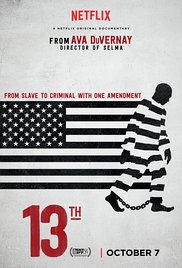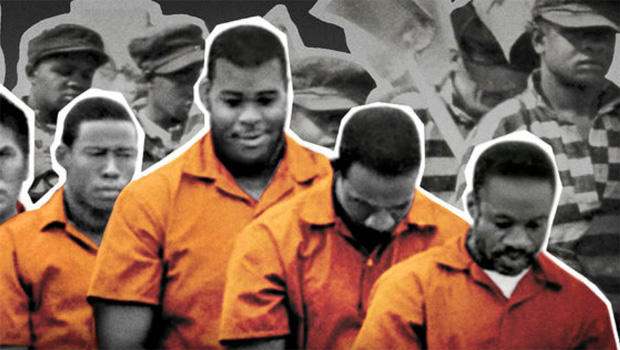 Sometimes to be a film-lover is to question why we indulge in certain films. It’s a question we have no doubt all asked ourselves at one point or another after a particularly gruelling film. It would have been so much easier to just let it slip passed us and be content within our bubble. It would be easy to see 13th, for instance, the new documentary from Selma and Middle of Nowhere director Ava DuVernay, on our Netflix screens and think that it is not for us – that because we already see the world through a lens of equality without racism that it is not necessary viewing, that it is just preaching to the converted. Why spend 100 minutes feeling as if the weight of misery is bearing down on us?
Sometimes to be a film-lover is to question why we indulge in certain films. It’s a question we have no doubt all asked ourselves at one point or another after a particularly gruelling film. It would have been so much easier to just let it slip passed us and be content within our bubble. It would be easy to see 13th, for instance, the new documentary from Selma and Middle of Nowhere director Ava DuVernay, on our Netflix screens and think that it is not for us – that because we already see the world through a lens of equality without racism that it is not necessary viewing, that it is just preaching to the converted. Why spend 100 minutes feeling as if the weight of misery is bearing down on us?
But 13th is an essential viewing for everybody. It is essential for you and for myself. Essential for Americans and those outside its borders. Essential most of all for white people and black people and everybody else. That its subject and themes still bear immediate relevance make it so. But DuVernay’s best achievement with the thorough and the soulfully searching 13th isn’t that it is just a wake-up call for race relations in America right at this very moment, but that her film will no doubt prove to be invaluable in the understanding of America’s history of racism for years to come.

DuVernay’s third feature documentary (after This is the Life and Live from the Essence Music Festival) chooses the impossible prospect of covering an entire century’s worth of racism and filtering it through the prism of today’s continued epidemic of mass incarceration of black and latino people. It sounds daunting because it is.
But DuVernay is a smart filmmaker. She uses archival video well from classic Hollywood films like The Birth of a Nation that show violent, almost animalistic black men and juxtaposes it with real footage from the civil rights era through to today of violent and indeed animalistic white men assaulting innocent people of color. She has also assembled a collection of talking heads that are real experts (like Angela Davis, below) and not just high profile faces to lend star power. The film doesn’t cover everything – how could it possibly even attempt that? But by zeroing in on the very specific parts that she has, DuVernay has created an immediate and really effecting work.

And indeed, Trump shows up as a figure towards the end of 13th. As does Hillary Clinton, and not all that favourably (although in comparison, as in everything else with that pair , she may as well be a saint). It is important that they do as it would be disingenuous not to feature them; in many ways, 13th acts as a line in the sand – before and after. Where the country, and indeed the world (America is not alone in this regard), goes from here is unknown, but like many other things in America there will surely be time for a sequel. It's disheartening to think how quickly it could come.
Release: Currently streaming on Netflix.
Oscar chances: Two weeks ago we looked of how the new wave of documentaries being distributed via Netflix used the platform to their advantage and how they did not. For 13th it allows its audience to see this up-to-the-moment documentary en masse right now when it is most pertinent without the obstacles that face the theatrical exhibition of non-fiction cinema. Even if we may time and again decry the loss of the film-going experience, 13th is in many ways the ultimate stamp of approval for Netflix’s distribution model. For beyond Michael Moore’s Fahrenheit 9/11 in 2004, no documentary has the ability to reach such mass exposure at a most vital moment of time as this one has. And if the Academy were feeling iffy about giving a statue to a movie that was released through a streaming service (without a theatrical run like, say, Amazon and Manchester by the Sea) then they may as well rip the band-aid off here because whether we like it or not, this is the now and the future.
But, then again, who knows what whims the race will throw at us. There’s no shortage of great documentaries this year (it's a very rich year) about issues of immediate relevance. It seems hard to imagine it won’t make the shortlist and for now we’re confident. But eggs in baskets should never be counted with this branch this early.